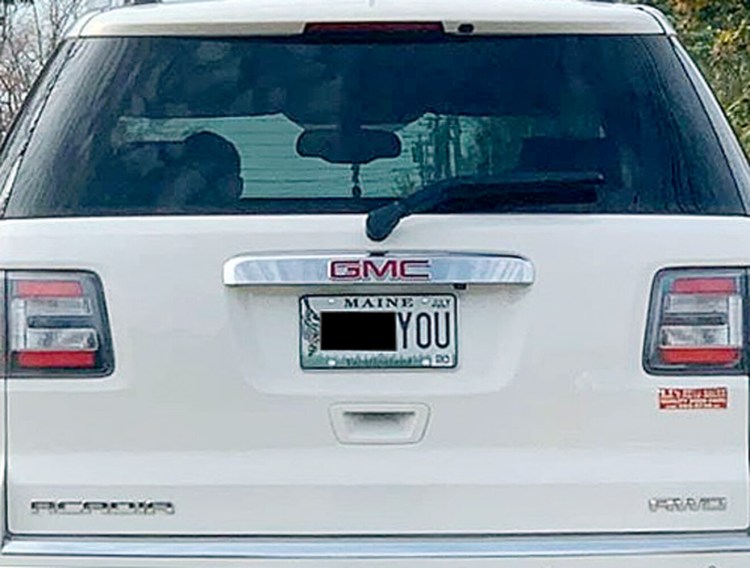Legislators are pushing for new prohibitions on obscene or objectionable vanity license plates and want to give the secretary of state the power to recall a growing number of such license plates that already are in use.
Secretary of State Shenna Bellows testified in support of the measures at a public hearing Tuesday, and said some tweaks may be necessary to prevent a successful court challenge under the First Amendment.
Support for the new limits from Bellows, a former executive director of the ACLU of Maine, is a break from her predecessor, Matthew Dunlap, who told legislators in the past that limiting such plates could be considered a violation of a driver’s constitutionally protected free speech and might not be defensible in court.
Dunlap was in office when the Legislature relaxed the standards in 2015, effectively allowing obscenities but barring messages that might incite violence – what he referred to as “fighting words.” That change opened the door to a wide variety of vulgar and offensive messages, according to those supporting tighter rules.
The issue arose during the short legislative session in 2019 but after the window to submit new bills already had closed. On Tuesday, three new proposals to regulate the plates were the focus of a hearing before the Legislature’s Transportation Committee.
In her testimony, Bellows said she would work with the Attorney General’s Office to suggest amendments to address the constitutional issues, and would follow the lead of several other states, including New Hampshire, where carefully crafted regulations have so far gone unchallenged.
She said that license plates are state property, and therefore the government has a legitimate interest in regulating speech contained on them. Bellows said the limitations the government imposes on license plate messages must be narrowly tailored, and likened their regulation to bans on using swear words on broadcast television.
“A citizen may post a sign on their property or a bumper sticker on their vehicle with the most offensive slogan they can choose,” Bellows said in testimony supporting L.D. 130. “But a registration plate is not a bumper sticker.”
Vanity plate regulation varies from state to state, and legal challenges are not uncommon. Courts have struck down provisions they have deemed too vague and therefore open to arbitrary interpretation.
A federal judge issued a preliminary ruling last fall striking down Rhode Island’s law permitting administrators to make judgments based on what they deemed to be offensive to good taste or decency. Nearly identical language also was struck down by a federal judge in California late last year.
A court in New Hampshire struck down similar limits in 2014, but that state now uses a standard that closely hews to more specific limits being considered in Maine.
Bellows was the only person to testify on each proposal. She brought with her a photo collage sampling some of the plates that contain or refer to obscene words or acts, most of which are unprintable here. Only a few of the examples did not contain explicit language or references to sex. One plate appeared to refer to Gov. Janet Mills, with her last name preceded by an expletive.
The sponsor of one bill, Sen. William Diamond, D-Windham, said vanity plates originally were intended to raise extra money for the Bureau of Motor Vehicles while giving motorists license to be fun and creative, but what he and his constituents have seen in recent years is an “extraordinary escalation of vulgarity,” he said.
“The degree of obscenity and also insults that are allowed have gotten out of control and are beyond what most people would consider reasonable expression or statements,” Diamond said during the hearing. “This bill is not an attempt to apply strict puritan guidelines to what people may display on their assigned plates. Instead, it’s a bill that would give the secretary of state the authority to prohibit the most vulgar of personal attacks and insults from being displayed.”
The proliferation of the obscene plates has increased, Bellows said. A cursory search of common “four letter words” in the BMV records system found about 421 plates out of more than 119,000 vanity registrations that may run afoul of the new limits, her office said, but the potential number of offensive plates could be higher. About 1.4 million vehicles are registered statewide.
Diamond’s bill would specifically prohibit references to genitalia, buttocks, breasts or “eliminatory functions,” and vulgar or obscene language including racial slurs or epithets based on gender identity, sexual orientation or disability status.
The measure also would prohibit referring to “an intoxicant or drug” or its use, non-use, sale or purveyance, and would prohibit any abbreviations or slang for words prohibited by other parts of the bill. It also would give Bellows’ office the power to cancel plates that are deemed objectionable under the new law and recall them.
Bellows said that if the bill is passed into law, her office would develop a policy on how to evaluate license plates for obscenity, using a model policy developed by the American Association of Motor Vehicle Administrators as a guide. The guidelines call for examining a plate’s meaning by reading it forward, backward and as a mirror image. Words that are not fully spelled out but can be deciphered phonetically also would be barred.
Send questions/comments to the editors.




Success. Please wait for the page to reload. If the page does not reload within 5 seconds, please refresh the page.
Enter your email and password to access comments.
Hi, to comment on stories you must . This profile is in addition to your subscription and website login.
Already have a commenting profile? .
Invalid username/password.
Please check your email to confirm and complete your registration.
Only subscribers are eligible to post comments. Please subscribe or login first for digital access. Here’s why.
Use the form below to reset your password. When you've submitted your account email, we will send an email with a reset code.